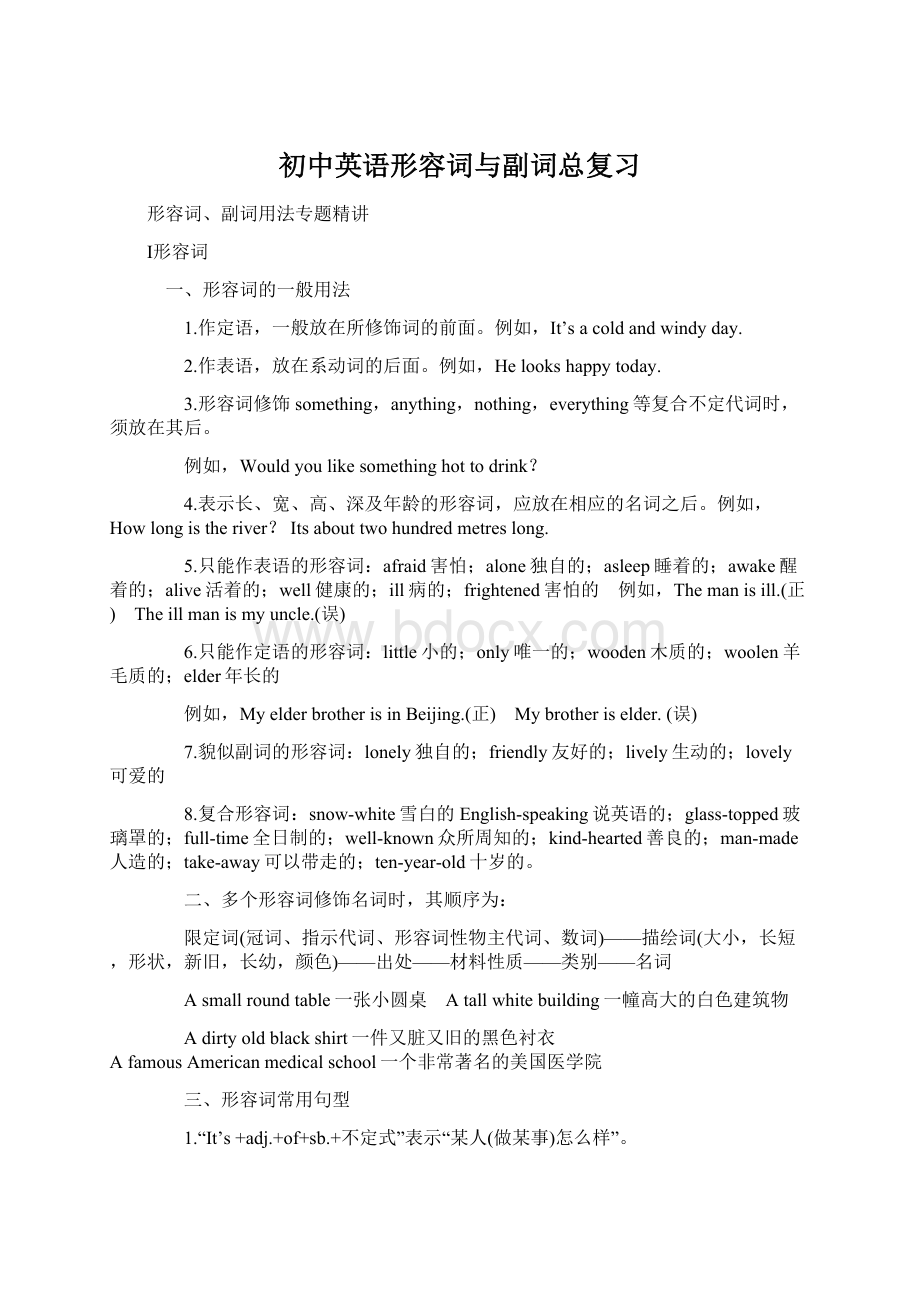初中英语形容词与副词总复习.docx
《初中英语形容词与副词总复习.docx》由会员分享,可在线阅读,更多相关《初中英语形容词与副词总复习.docx(12页珍藏版)》请在冰豆网上搜索。

初中英语形容词与副词总复习
形容词、副词用法专题精讲
Ⅰ形容词
一、形容词的一般用法
1.作定语,一般放在所修饰词的前面。
例如,It’s a cold and windy day.
2.作表语,放在系动词的后面。
例如,He looks happy today.
3.形容词修饰something,anything,nothing,everything等复合不定代词时,须放在其后。
例如,Would you like something hot to drink?
4.表示长、宽、高、深及年龄的形容词,应放在相应的名词之后。
例如,How long is the river?
Its about two hundred metres long.
5.只能作表语的形容词:
afraid害怕;alone独自的;asleep睡着的;awake醒着的;alive活着的;well健康的;ill病的;frightened害怕的 例如,The man is ill.(正) The ill man is my uncle.(误)
6.只能作定语的形容词:
little小的;only唯一的;wooden木质的;woolen羊毛质的;elder年长的
例如,My elder brother is in Beijing.(正) My brother is elder. (误)
7.貌似副词的形容词:
lonely独自的;friendly友好的;lively生动的;lovely可爱的
8.复合形容词:
snow-white雪白的 English-speaking说英语的;glass-topped玻璃罩的;full-time全日制的;well-known众所周知的;kind-hearted善良的;man-made人造的;take-away可以带走的;ten-year-old十岁的。
二、多个形容词修饰名词时,其顺序为:
限定词(冠词、指示代词、形容词性物主代词、数词)——描绘词(大小,长短,形状,新旧,长幼,颜色)——出处——材料性质——类别——名词
A small round table一张小圆桌 A tall white building一幢高大的白色建筑物
A dirty old black shirt一件又脏又旧的黑色衬衣 A famous American medical school一个非常著名的美国医学院
三、形容词常用句型
1.“It’s +adj.+of+sb.+不定式”表示“某人(做某事)怎么样”。
注意:
这一句型中常用描述行为者的性格、品质的形容词,如good(好的),kind(友善的),nice(友好的),polite(有礼貌的),clever(聪明的),foolish(愚蠢的),lazy(懒惰的),careful(细心的),careless(粗心的),right(正确的),wrong(错误的)等。
例如,It’s very kind of you to help me.(=You are very kind to help me.)你能帮助我,真好。
It’s very rude of her to say such words.(=She is very rude to say such words.)她说这样的话,真粗鲁。
It’s foolish of him to go alone.(=He is foolish to go alone.)他单独出去太傻了。
2.“It’s+adj.+for+sb.+不定式”表示“做某事对某人来说怎么样”。
注意:
这一句型中常用的形容词有important(重要的),necessary(必要的),difficult(困难的),easy(容易的),hard(艰难的),dangerous(危险的),safe(安全的),useful(有益的),pleasant(舒适的),interesting(有趣的),impossible(不可能的)等。
例如,It’s not easy for them to learn a foreign language.(=To learn a foreign language is not easy for them.)
对于他们来说学好一门外语不容易。
Its very important for students to listen to teachers carefully.(=To listen to teachers carefully is very important for students.)对于学生来说上课认真听老师讲课是非常重要的。
It’s necessary for us to get to school on time.(=To get to school on time is necessary for us.)
对于我们来说按时到校是非常必要的。
3.表示感情或情绪的形容词,如glad(高兴的),pleased(高兴的),sad(忧伤的),thankful(感激的)等常接不定式。
例如,Glad to see you.见到你非常高兴。
I’m very sad to hear the bad news.听到这个坏新闻,我非常难过。
4.表示能力和意志的形容词,如ready(乐意的,有准备的),able(有能力的),sure(一定),certain(一定)等常接不定式。
例如,Lei Feng is always ready to help others.雷锋总是乐于助人。
Ⅱ副词
-命题趋势
副词是历年各省市中考必考知识点。
从考查形式看,一般有单项选择、完形填空、词语运用等。
所占分值通常为2~4分。
从命题意图看,侧重考查考生的具体语言环境中使用副词的能力。
-考查重点
中考试题对副词的考查涉及常用副词的用法、副词等级的各种句型、易混淆的副词用法辨析等。
其中,频度副词always,often,usually,sometimes,never,时间副词already,yet,still,just,疑问副词how,why,when,where,程度副词enough,quite以及too,also,either等的用法区别,副词比较等级句型是考查的热点。
一、副词的分类
副词按词汇意义可分为:
频度副词:
always,often,usually,sometimes,seldom,never 否定副词:
no,not,neither,nor,
疑问副词:
where,how,why 其他:
also,too,only
二、副词的基本用法:
副词是用来修饰动词、形容词、其他副词以及全句话的词类,表示时间、地点、程度、方式等概念。
例如,1.We should listen to our teachers carefully.我们应该认真听老师讲课。
2.He is very happy today.他今天非常高兴。
3.“What happened?
”I asked,rather angrily.“发生什么事情了?
”我相当生气地问。
4. In spring,I can see flowers everywhere.在春天,我到处都能看到花。
三、常见副词用法辨析
1.very,much和very much.的区别
very用于修饰形容词或副词的原级;much用于修饰形容词或副词的比较级;修饰动词要用very much.
例如,John is very honest.约翰非常诚实。
This garden is much bigger than that one.这个花园比那个大的多。
Thank you very much.非常感谢你
2.so与such的区别
⑴so修饰形容词或副词;such 修饰名词,
例如,My brother runs so fast that I can’t follow him.我弟弟跑得那么快以至于我跟不上他。
He is such a boy.他是一个这样的孩子。
⑵so修饰的形容词后可以有一个单数的可数名词,其结构是“so+形容词+a/an+可数名词单数”.
such可以修饰可数名词单复数和不可数名词,名词前可以有形容词作定语,其结构是“such+a/an+形容词+可数名词单数”,“such+形容词+可数名词复数/不可数名词”, . 例如,He is so clever a boy.=He is such a clever boy.他是一个如此聪明的孩子。
It is such cold weather.这么冷的天气。
(正) It is so cold weather.(误)
They are such good students. 他们是那么好的学生。
(正) They are so good students. (误)
⑶如果可数名词复数前有many,few或不可数名词前有much,little修饰,用so不用such.
例如,so many(如此多的);so few(如此少的)可以加可数名词复数 so much(如此多的);so little(如此少的)可以加不可数名词
3.also,too,as well与either 的区别
also,as well,too,用于肯定句,also常用于be动词,情态动词,助动词之后,行为动词之前;as well,too用于句末;either用于否定句中,置于句末。
例如,My father is a teacher. My mother is also a teacher. =My father is a teacher. My mother is a teacher as well.
=My father is a teacher. My mother is a teacher,too.我爸爸是一名老师,我妈妈也是。
I can’t speak French.. Jenny can’t speak French,either.我不会说法语,詹妮也不会。
4.sometime,sometimes,some time与some times的区别
sometime:
某一时间,某一时刻,可指将来时,也可指过去时 sometimes:
有时,不时的 some time:
一段时间
some times:
几次,几倍
. 例如,We’ll have a test sometime next month.下个月的某一时间,我们要进行一次测试。
Sometimes we are busy and sometimes we are not.有时我们很忙,有时不忙。
He stayed in Beijing for some time last year.他去年在北京呆了一段时间。
I have been to Beijing some times.我去过北京好几次。
Ⅲ、形容词,副词的比较级、最高级
一、规则变化
1.一般在词尾直接加er或est,例如,tall-taller-tallest,long-longer-longest
2.以不发音的字母e结尾的单词在词尾直接加r或st,例如,nice-nicer-nicest
3.以辅音字母+y结尾的词,把y变为i,再加er或est,例如,heavy-heavier-heaviest
4.重读闭音节,末尾只有一个辅音字母,双写这个辅音字母,再加er或est,例如,big-bigger-biggest
5.部分双音节词和多音节词分别在原级前加more构成
比较级和most构成最高级,例如,slowly-more slowly-most slowly;beautiful-more beautiful-most beautiful
二、不规则变化
下列单、双音节词只能加more和most.
Ⅳ形容词,副词
等级的用法
一、原级的用法
1.只能修饰原级的词,very,quite,so,too
例如,He is too tired to walk on.他太累了以至于不能再继续走了。
My brother runs so fast that I can‘t follow him.我弟弟跑得那么快以至于我跟不上他。
2.原级常用的句型结构
(1)“甲+be+(倍数)+as+形容词原级+as+乙”表示“甲和乙程度相同”或“甲是乙的几倍”
例如,Tom is as old as Kate.汤姆和凯特年龄一样大。
Tom is twice as old as Kate.汤姆的年龄是凯特的二倍。
“甲+实意动词+(倍数)+as+副词原级+as+乙”表示“甲和乙程度相同”或“甲是乙的几倍”
例如,Tom runs as fast as Mike.汤姆和迈克跑得一样快。
Tom runs twice as fast as Mike.汤姆跑得速度是迈克的二倍。
(2)“甲+be+not+as/so+形容词原级+as+乙”甲不如乙…例如,This room is not as/so big as that one. 这个房间不如那个大。
“甲+助动词+not+动词原形+as/so+副词原级+as+乙”甲不如乙…
例如,He doesn’t walk as slowly as you.他走路不像你那样慢。
二、比较级的用法
1.可以修饰比较级的词,much,a lot,far,…的多a little,a bit,…一点儿 even甚至,still仍然
例如,Lesson One is much easier than Lesson Two.第一课比第二课容易得多。
Tom looks even younger than before.汤姆甚至比以前更年轻。
This train runs much faster than that one.这辆火车比那辆跑地快。
She drives still more carefully than her husband.她开车仍然比她丈夫还认真。
2.比较级常用的句型结构
(1)“甲+be+(倍数)+形容词比较级+than+乙”表示“甲比乙…”或“甲比乙…几倍”
例如,Tom is taller than Kate.汤姆比凯特高。
This room is three times bigger than that one.这个房间比那个大三倍。
“甲+实意动词+(倍数)+副词比较级+than+乙”表示“甲比乙…”或“甲比乙…几倍”
例如,I got up earlier than my mother this morning.我今天早晨起床比我妈妈还早。
He runs three times faster than his brother.他跑的速度比他弟弟快三倍。
(2)“甲+be+形容词比较级+than+any other+单数名词(+介词短语)”表示“甲比同一范围的任何一个人/物都……”,含义是“甲最……”。
例如,The Yangtze River is longer than any other river in China.
=The Yangtze River is longer than any of the other rivers in China.长江比中国的任何一条其他的河都长。
=The Yangtze River is longer than the other rivers in China.长江比中国的其他所有的河都长。
=The Yangtze River is the longest river in China.长江是中国最长的河流。
注意:
The Yangtze Riveris longer than any river in Japan.长江比日本的任何一条河都长。
“甲+实意动词+副词比较级+than+anyother+单数名词(+介词短语)”表示“甲比同一范围的任何一个人/物都……”,含义是“甲最……”。
例如,Mike gets to school earlier than any other student in his class.
= Mike gets to school earlier than any of the other students in his class.迈克比他们班上任何一个其他的同学到校都早。
Mike gets to school earlier than the other students in his class.迈克比他们班上其他的同学到校都早。
= Mike gets to school earliest in his class.迈克在他们班到校最早。
注意:
Mike gets to school earlier than any student in Tom’s class.迈克比汤姆班上任何一个学生到校都早。
(迈克和汤姆不是同一个班)
(3)“甲+be+the+形容词比较级+ofthetwo+……”表示“甲是两者中较……的”。
例如,Look at the two boys.My brother is the taller of the two.看那两个男孩,我弟弟是两个当中较高的那个。
(4)“比较级+and+比较级”表示“越来越……”。
例如,He is getting taller and taller.他变得越来越高了。
He does his homework more and more carefully.他做作业越来越认真了。
(5)“the+比较级,the+比较级”表示“越……,越……”。
例如,The more careful you are,the fewer mistakes you’ll make.你越认真,犯的错误越少。
(6)“特殊疑问词+be+形容词比较级,甲or乙?
”
例如,Which is bigger,the earth or the moon?
哪一个大,地球还是月球?
“特殊疑问词+实意动词+副词比较级,甲or乙?
”
例如,Who draws better,Jenny or Danny?
谁画得比较好,詹妮还是丹尼?
3.最高级常用句型结构
(1)“主语+be+the+形容词最高级+单数名词+in/of短语”表示“……是……中最……的”。
例如,Tom is the tallest in his class./of all the students.汤姆是他们班上/所有学生当中最高的。
This apple is the biggest of the five.这个苹果是五个当中最大的。
“主语+实意动词+(the)+副词最高级+单数名词+in/of短语”表示“……是……中最……的”。
例如,I jump (the) farthest in my class.我是我们班跳得最远的。
(2)“主语+be+oneofthe+形容词最高级+复数名词+in/of短语”表示“……是……中最……之一”。
例如,Beijing is one of the largest cities in China.北京是中国最大城市之一。
(3)“特殊疑问词+be+the+最高级+甲,乙,or丙?
”用于三者以上的比较。
例如,Which country is the largest,China,Brazil or Canada?
哪一个国家最大,中国,巴西还是加拿大?
“特殊疑问词+be+the+副词最高级+甲,乙,or丙?
”用于三者以上的比较
例如,Which season do you like (the) best,spring,summer or autumn?
你最喜欢哪一个季节,春天,夏天还是秋天?
-例题剖析
1 I have_____to do today.
A.anything important B.something important C.important nothing D.important something
答案B形容词修饰复合不定代词时应放在其后面。
故排除C、D,句意是“我今天有重要的事情要做”,表示肯定用something。
2 ———Is chemistry more difficult than physics?
———No,chemistry isn’t as____as physics.
A.easy B.difficult C.easier D.moredifficult
答案B(not)as…as中应接形容词原级,结合上句“化学没有物理难”,故B是正确的。
3.Beijing is becoming_________and__.
A.more beautiful,more B.beautiful,beautiful C.more,more beautiful D.more beautiful,more beautiful
答案C比较级+and+比较级,表示“越来越…”,多音节的形容词“more and more+形容词”。
4.______ children there are in a family,_____their life will be.
A.The less,the better B.The fewer,the better C.Fewer,richer D.More,poorer答案B
the+比较级,the+比较级,表示“越……越……”,由句意得知“家里孩子越少,生活会越好”。
children是可数名词,应用few来修饰。
5.The experiment was ________ easier than we had expected. A.more B.much more C.muchD.more much
答案C much可修饰比较级,easier本身已是比较级,不能再用more.
6 Oct 15th was one of ________ days in 2003.The Shenzhou-V was sent up successfully.
A.exciting B.more excitingC.the most exciting D.much exciting
答案C根据“one of+最高级+复数名词”固定句型应选C。
7.It’s seven o’clock in the afternoon,but they are ______ having a meeting. Aalready B.still C.yet D.ever
答案Bstill意为“仍旧,仍然”,这句话的意思是:
现在已经是下午七点,他们仍旧在开会。
The flowers are more and more beautiful.花儿越来越漂亮。
8.Remember not to speak _______ when